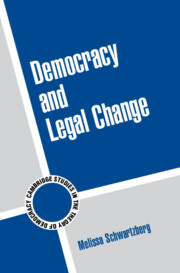Book contents
- Frontmatter
- Contents
- Acknowledgments
- 1 Introduction: Explaining Legal Change and Entrenchment
- 2 Innovation and Democracy: Legal Change in Ancient Athens
- 3 Legislation and Law Reform in Seventeenth-Century England
- 4 Fallibility and Foundations in the U.S. Constitution
- 5 Protecting Democracy and Dignity in Postwar Germany
- 6 Conclusion: Defending Democracy Against Entrenchment
- References
- Index
3 - Legislation and Law Reform in Seventeenth-Century England
Published online by Cambridge University Press: 24 July 2009
- Frontmatter
- Contents
- Acknowledgments
- 1 Introduction: Explaining Legal Change and Entrenchment
- 2 Innovation and Democracy: Legal Change in Ancient Athens
- 3 Legislation and Law Reform in Seventeenth-Century England
- 4 Fallibility and Foundations in the U.S. Constitution
- 5 Protecting Democracy and Dignity in Postwar Germany
- 6 Conclusion: Defending Democracy Against Entrenchment
- References
- Index
Summary
In ancient Athens, as we have seen, legal change and innovation more generally were considered democratic traits. Yet despite the pride that the Athenians took in their capacity to confront contingency through legislative means, they occasionally had recourse to immutability, primarily as a means of reassuring anxious allies. The link between democracy and legal change through an ongoing process of legislation coexisted with an awareness of the costs associated with flexible law: The Athenians were neither naïve nor irrational in their decision to preserve a deliberate and deliberative mechanism of changing law in the fourth century. In fact, the commitment to legal change proved to be one of Athens' enduring legacies. In particular, James Harrington highlighted the Athenian activity of enacting and modifying law, conducted in the assembly via chirotonia (counting of hands), as a fundamental act of popular government. In Harrington's words: “The legislative assembly or representative of the people, called the nomothetae, upon occasion of repealing an old law and enacting a new one, gave the chirotonia of the people.” Harrington, as Pocock has shown, used this claim to demonstrate the civil nature of the choice of clergy and that, “[T]he primitive ecclesiae had been assemblies of citizens in the Athenian sense of the noun ekklesia.” Although Harrington's focus was on election rather than legal change per se, the distinctively legislative function of the Athenian assembly nevertheless constituted fertile ground for the development of republican thought.
- Type
- Chapter
- Information
- Democracy and Legal Change , pp. 71 - 114Publisher: Cambridge University PressPrint publication year: 2007



